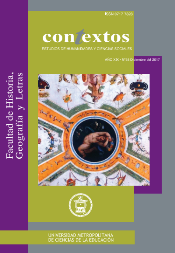Main Article Content
Dec 22, 2017
Abstract
Through history and several cultures, women’s bodies and everything related to their sexual and biological processes has had various interpretations, judgements and social stigmatization. Particularly about menstruation, it is interpreted as a symbol of disgrace filthiness and impurity, and women in their bleeding days were rejected or isolated. Currently, menstruation is a social taboo, being censored and demoted as something purely personal. The latter works from power relationships controlling discourses around sexuality and women’s bodies. Linked to what was said before, this work tries to establish how this patriarchal power is exerted over menstruation and female bodies through a critical analysis on different posters located in women’s bathrooms in Santiago.
Downloads
Policies for open access journals
Authors who publish here accept the following terms: Authors will keep their copyright and will guarantee the journal the right to the first publication of their work, which will be subject to the Licence of Creative Commons acknowledgement, which allows for the use of this material only if the authorship is credited and the original source is acknowledged (the journal’s URL), and if it is not used with commercial ends and with any derivations of the original work.
Authors may adopt other non-exclusive license agreements of distribution of the published version (e.g. to save it onto a digital institutional archive or publish it in a monographic volume) only if the initial publication of this journal is indicated.
It is permitted and recommended for authors to divulge their work on the Internet (e.g. institutional digital archives or webpage) before and during the submission process, which may lead to interesting exchanges and increase the citations of the publication. (See Open Access Effect).






